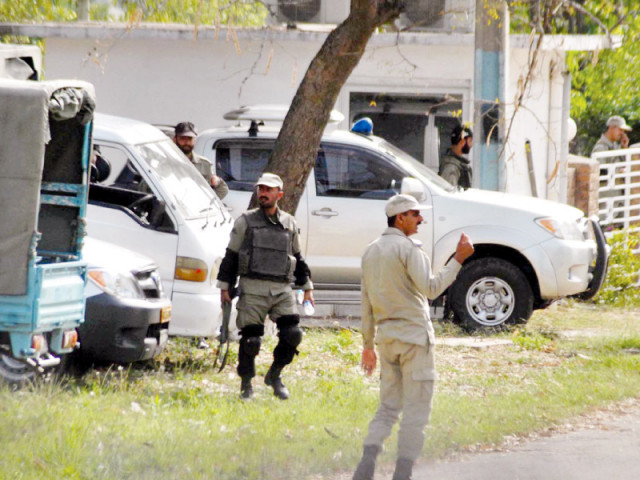Judicial remand: Locked Up
Musharraf to appear before anti-terrorism court; judge censures IG police.

Rangers personnel stand guard outside the police headquarters. PHOTO: ONLINE
It took 24 hours for the Islamabad police to finally arrest the former military ruler General (retd) Pervez Musharraf.
On Friday, Secretariat police took Musharraf into custody from his Chak Shahzad Farmhouse, with police sources saying that it was Musharraf himself who decided to give in.
He was then presented before a judicial magistrate who sent him on a transit judicial remand for two days. Musharraf was then shifted, under tight security, to the Police Lines Headquarters where he was locked up.
His quarters are quite a change from the halls of power he once roamed, and even from the spacious confines of his Islamabad farmhouse. The former president is now incarcerated in a newly constructed barracks with few amenities.
“It is a new building and doesn’t have facilities like air-conditioners or even backup power in case of load-shedding,” said a police official privy to the arrangements, while also saying that the HQ’s administration has been directed to look after all the needs of the former president.
Before sending him on remand, the judicial magistrate directed the local police to include 7-ATA (Anti-Terrorism Act) in the FIR (First Information Report) against Musharraf, as ordered by the Islamabad High Court (IHC). The former president will likely be produced before the Anti-Terrorism Court (ATC) within 48 hours.
Once he arrived at the police headquarters, Musharraf was made to record a statement in the presence of the Superintendent Police (Secretariat) Muhammad Ilyas and the Station House Officer (SHO) Mubarik Ali.
“Musharraf denied the charges of keeping superior judiciary judges in illegal detention. He said he gave no written orders for any such detention,” said a police official on condition of anonymity.
Musharraf told the police that if the judges were detained, it was on the orders of the then government and administration. He said that they should also be made a party to the case.
Musharraf evaded arrest on Thursday after the Islamabad High Court rejected his bail plea. To the amazement of onlookers and the anger of gathered lawyers, he walked out of the courtroom with the police not lifting a finger to stop him. The high court judge Shaukat Aziz Siddiqui then summoned the Inspector General of Police (IGP) Islamabad Bani Amin to answer for this non-compliance of court orders.
Amin appeared before the court on Friday maintaining that he took action against the police officials ‘responsible for the lethargy’. The court, while refusing to accept his explanation, did however restore the SHO secretariat and the Investigation Officer (IO) earlier suspended by the IGP on Musharraf’s non-arrest.
The court also directed the interior ministry to take action against the IGP and report to the court on April 23 as he was responsible for the failure to arrest Musharraf despite the court’s orders.
Friday’s proceedings began with Justice Siddiqui asking Amin about his whereabouts when Musharraf’s case was being heard in court. Amin said he was busy in arrangements for the international judicial conference in the Supreme Court, while the Senior Superintendent of Police (SSP) was deputed at the IHC.
That explanation didn’t sit well with Justice Siddiqui. “Don’t confuse the matter; the SSP operation was deputed for Musharraf’s security and not for the proceedings. You are the person responsible for yesterday’s drama,” observed Justice Siddiqui.
The Secretariat Police, under the supervision of Additional Inspector General of Police (AIG) Operations Sultan Azam Temuri, launched investigations into the Thursday episode. The police IO and the SHO were summoned to record their statements on Saturday.
However, the issue of sending Musharraf on ‘transit judicial remand’ does raise a question.
Transit remand is normally given when a suspect is arrested from one district or province and has to be shifted to another. In this case, the police said Musharraf had to be produced before the ATC Rawalpindi, and thus the civil judge granted transit remand.
However, an anti-terrorism court has already been established in Islamabad and the District and Session Judge Islamabad was given the additional charge of also presiding over the ATC. It is this ATC that will see if 7-ATA was maintainable when Musharraf is produced before the court.
“It was the middle way,” said a police officer while speaking off the record. It will help the police keep Musharraf at the police headquarters and delay the proceedings for a day or two,” he said.
Published in The Express Tribune, April 20th, 2013.



















COMMENTS
Comments are moderated and generally will be posted if they are on-topic and not abusive.
For more information, please see our Comments FAQ